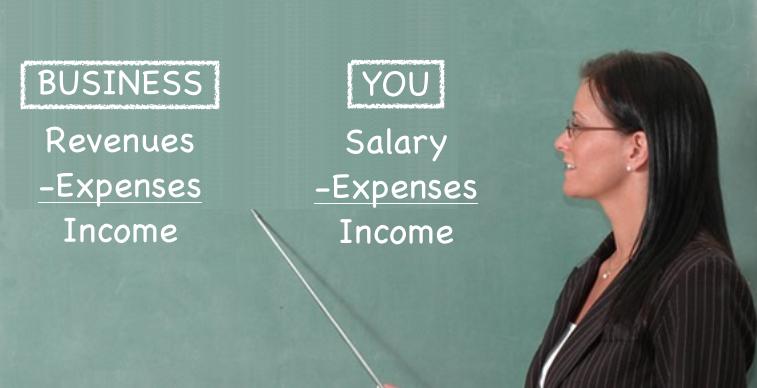One of the most common synonyms for the word salary is the word income.
This is 100% false.
This language supports the underlying belief that the highest paying job is the best job. As a result, many people get caught up in the never-ending game of more, more, more through work, work, work in hopes that more will lead to greater happiness.
This belief is one of the leading causes of workaholism—a problem that I am committed to solving given my own journey as a recovering workaholic and the damage it caused to my health and relationships.
Your salary is your revenue, not your income.
Here’s why your salary is not your income.
In business,
INCOME = REVENUES – EXPENSES
Therefore, a business’ income is what’s left over at the end of the month—not what they earn in revenues during the month.
So if we apply this same equation to our personal finances, what we call our salary or income is really just our revenues. Revenues is the amount of money you earn.
For us,
OUR SALARY = OUR REVENUES
Therefore,
INCOME = SALARY – EXPENSES
Two people with the same salary (aka revenues) can have completely different expenses, meaning that they also have completely different incomes. This means that they have designed their lives differently in terms of the size of their apartment or home, the kind of car they drive, what they do for entertainment, what they eat, etc. These choices come from being clear on what’s enough for you rather than trying to keep up with the Joneses.
How Much Is Enough For You?
When I’m speaking to any group and ask the question, “How many of you want to be rich?” Everyone raises their hand…sometimes two hands.
But then, when I ask, “How many of you have a specific number for what rich is to you?” All of the hands go down.
So we all say we want to be rich, but very few of us have ever defined it. In America, one million dollars is usually what most people say, but even that is vague. There are so many ways to measure wealth—$1M in savings, $1M in annual income, $1M in passive income, $1M in assets, $1M in net worth, etc. Not knowing how much or what rich means to us is our registration into the rat race. We keep running after more cheese and that race never ends.
I know people who make 6-figures who feel trapped because their cost of living rose with their salary. While they were getting paid more, their INCOME according to the equation above wasn’t increasing. It’s not about how much you make, it’s about how much you keep. Many people say that I would be perfectly fine with $100,000…until they get there. The key is establishing what’s enough for you.
Your Lifestyle Matters More Than Your Salary
Instead of playing the game of more, we can play the game of enough. All we have to do is define how much is enough to live how we want to live. Rather than blindly pursuing more, why not calculate how much your dream car, house, bedroom, living room, vacation, meals, days, weeknights, and weekends would actually cost you on an annual basis and design your life and career accordingly. Your dream lifestyle likely costs less than you imagine.
Your lifestyle matters more than your salary. There are people who live comfortably off of $40,000 per year because for them, a two-bedroom home in the suburbs of Alabama and an old Honda Accord is enough for them to pursue their passion for writing, help their kids with their homework, eat good food as a family, and take an annual family vacation.
For someone who desires more, $40,000 isn’t enough. But who is happier? Someone who knows what enough is and has it or someone who is in constant pursuit of more?
Oftentimes, we belittle the lifestyles of people who don’t live in major cities and don’t appear to be ambitious, when the truth is that many of them have what everyone else is looking for—home ownership, family nearby, leisure time…enough. Happiness, health, and the feeling of home are what we all really want, and there is likely a more direct path to get them than the endless pursuit of more money.
Salaries Also Have A Downside
While salaries provide some sense of certainty and consistency if you truly believe that your employer will be loyal to you, they also have several downside:
- If your salary is your only source of income and your employer lets you go, you are stuck. Roughly three-quarters of Americans are living paycheck-to-paycheck, with little to no emergency savings, according to a survey released by Bankrate.com. That’s why having multiple streams of income is more secure that just pursuing the highest paying job.
- Your salary doesn’t adjust according to the actual value you create. It only adjust based on the company’s pay scale and timeline.
- Your salary doesn’t automatically increase as your cost of living increases. We assume that our salary will always go up from where it is and we make big long-term purchases like homes, cars, or weddings based on that assumption which isn’t always true.
- A salary suggests that your employer owns you beyond the traditional Monday through Friday 9am-to-5pm schedule and can call on you anytime they want, encroaching on your personal life.
- And research shows that after $75,000, more money doesn’t make us happier.
Seek Abundance & Appreciate What You Have
A word that has helped me in my recovery from workaholism is abundance. Abundance means feeling like you have more than enough. It’s hard to experience abundance when we haven’t determined what enough is. I’ve been able to increase my sense of abundance by being grateful for what I already have. Regardless if my salary (aka revenues) increases, I can still experience more abundance.
We think that we will be more grateful when we have more. That may be true. But I believe that “appreciating” what you have now can and will only increase what you have later. The word appreciate literally means to increase in value and you can do that by simply acknowledging how many big and small things are working together for your good.
I hope that your salary increases over time, but more importantly, I hope that your happiness and gratitude increase whether your salary goes up or down. When our happiness is tied to money, it fluctuates with the economy. When our happiness isn’t tied to money, it is limitless.
Take off the salary cap 🙂
Wishing you more happy hours,
Jullien







